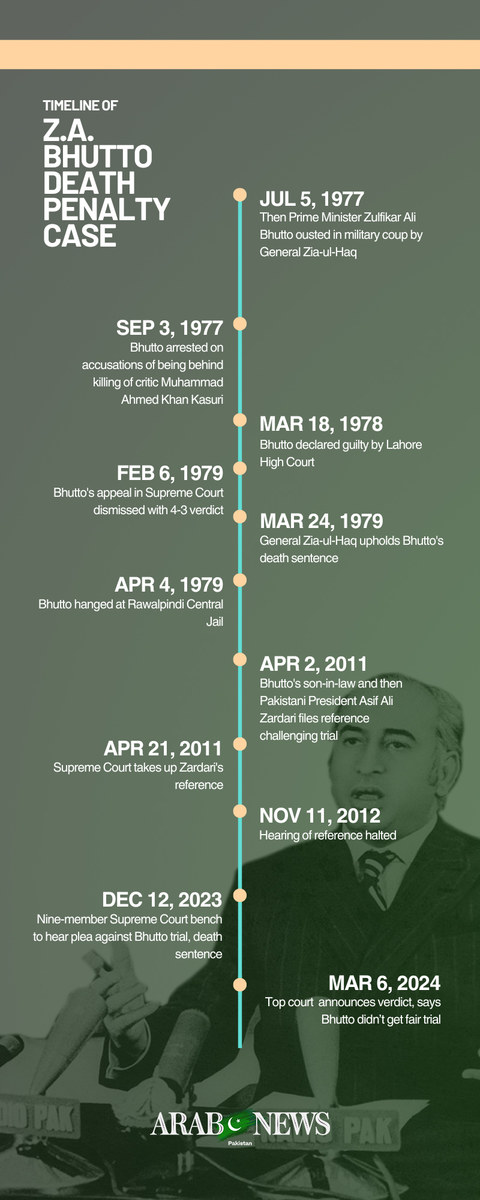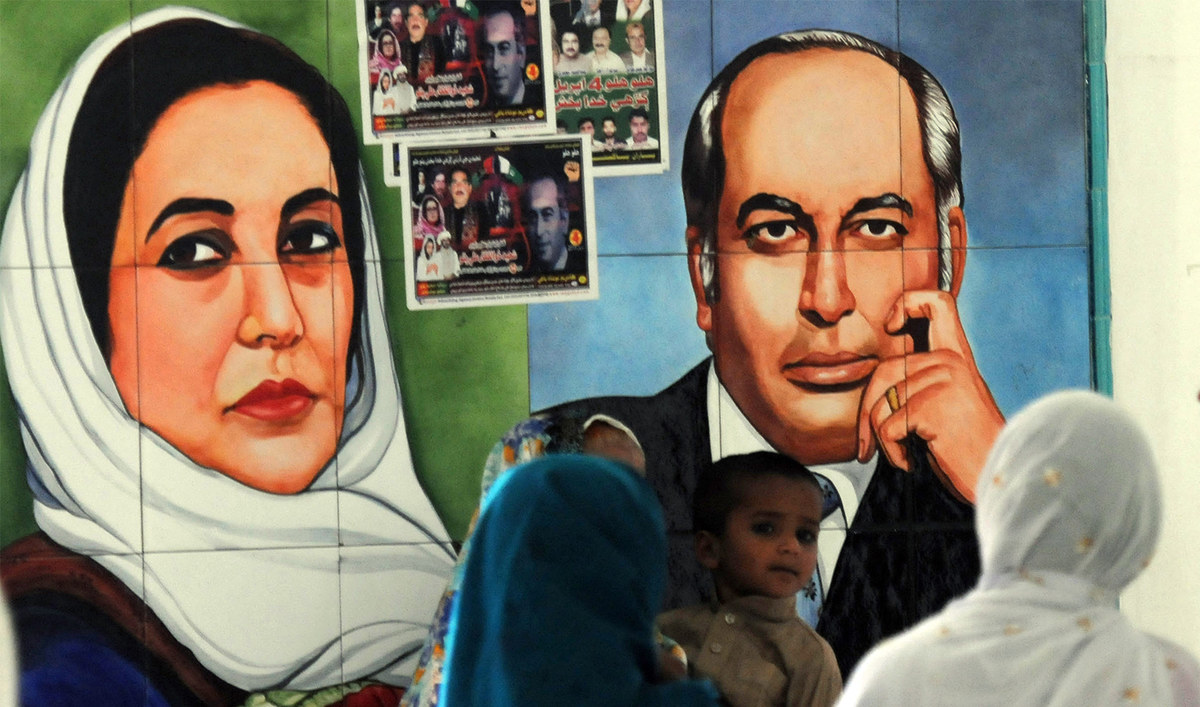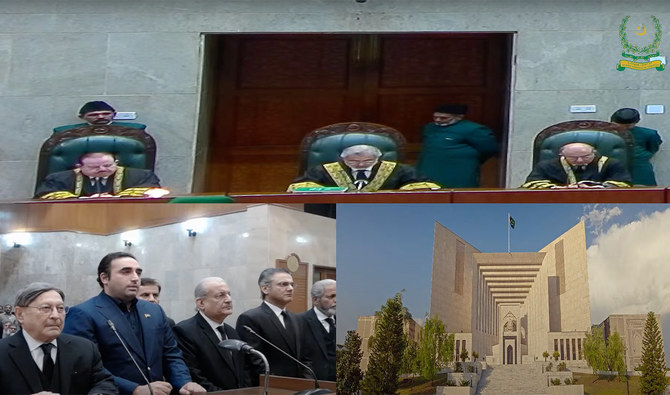KARACHI/ISLAMABAD: The Pakistan Supreme Court said on Wednesday former Prime Minister Zulfikar Ali Bhutto, hanged in 1979 following one of the country’s most controversial legal cases, did not get a fair trial, a verdict widely seen by the ex-premier’s family and political associates as a “correcting of history.”
Bhutto was hanged on April 4, 1979, in Rawalpindi District Jail, where he had been confined since his conviction on charges of conspiring to murder a political opponent. The charismatic, Western-educated leader who founded the Pakistan Peoples Party (PPP) served as the fourth president of Pakistan from 1971 to 1973, and later as the country’s ninth prime minister from 1973 to 1977. He was ousted in a military coup by General Mohammad Zia-ul-Haq on July 5, 1977, following an election in which Bhutto is widely charged with having rigged the vote.
Legal experts have for years questioned Bhutto’s trial both in the Lahore High Court and the Supreme Court, and raised questions on the conduct and procedure of the hearings, as well as on the fact that they took place while Pakistan was under military rule. Analysts argue this is the reason Bhutto’s death penalty judgment has never been cited as a precedent in any subsequent case in Pakistan’s judicial history.
“The proceedings of the trial by the Lahore High Court and of the appeal by the Supreme Court of Pakistan do not meet the requirements of the fundamental right to a fair trial and due process enshrined in Articles 4 and 9 of the constitution,” the chief justice said while announcing the unanimous opinion of the court under its advisory jurisdiction.

The guilty verdict against Bhutto is still considered one of the most controversial milestones in Pakistan’s history. His family and political supporters allege the judges came under pressure from Zia to sentence Bhutto to death.
Before his hanging, Bhutto was first declared guilty in 1978 by the Lahore High Court. His appeal in the Supreme Court was then dismissed with a 4-3 verdict.
The decision to hang Bhutto was made by General Zia despite a flood of petitions for executive clemency from dozens of world leaders, including US President Jimmy Carter, Russia’s Leonid I. Brezhnev, Chinese PM Hua Guofeng and Pope John Paul II, besides thousands of Bhutto’s Pakistani supporters.
Pakistani President Asif Ali Zardari, Bhutto’s son-in-law, filed a presidential reference in 2011 to review the 44-year-old death sentence. Only six hearings were conducted, the last of them in November 2012. A nine-member larger bench of the Supreme Court began rehearing the reference last December.
Prime Minister Shehbaz Sharif, in a statement following the verdict, said the top court had set “a new tradition” through its opinion.
“The unanimous opinion of the Supreme Court in the Bhutto reference will help understand history at the national level through the right perspective,” Sharif noted. “The process of national unity and development can be accelerated only by correcting the past mistakes and doing away with the bitterness.”

This photograph taken on April 4, 2013 shows supporters of Pakistan People's Party (PPP) walking past the portraits of former premier Zulfikar Ali Bhutto (R), father of Pakistan's slain former premier Benazir Bhutto (L), at the Bhutto's mausoleum in Garhi Khuda Bakhsh near Larkana on his death anniversary. (AFP/File)
The Bhutto family described the apex court’s decision as “historic and bold,” saying it has helped address the family’s and the PPP’s reservations after over four decades.
“This historic and bold opinion of the Supreme Court has helped correct the history besides addressing reservations of the family and the party,” Zulfikar Ali Badar, PPP Chairman Bilawal Bhutto-Zardari’s spokesperson, told Arab News.
“The party leadership has welcomed the court’s opinion,” he said. “The party will announce a strategy on how to celebrate it after the court releases a detailed opinion on it.”
Badar noted the court acknowledged its “historic mistake” and tried to correct it through a legal opinion. “The opinion is unanimous of all nine judges in the bench that is significant in many ways,” he said.
Legal experts said that while the court gave an opinion on Bhutto’s trial and procedural conduct, it had stopped short of giving its view on whether the ex-premier was guilty or not.
“This is a legal opinion of the court which is obviously significant and historic, but the court has refrained from commenting on Bhutto’s involvement in the murder case,” advocate Usama Malik told Arab News.
“The court has, in fact, given an opinion against its own institution that should also be followed by other institutions to accept their past mistakes and correct the course.”
He said the opinion remains “symbolic” if the Supreme Court fails to look into other important legal cases pending before it for adjudication, referring to a slew of criminal cases against former prime minister Imran Khan who has been in jail since August last year.
Former attorney-general of Pakistan, advocate Ashtar Ausaf, said the court’s opinion was a “very significant” one as it had revisited a judgment that had been criticized all along.
“The conviction they say was a result of procedural impropriety and violated the right of Mr.Bhutto for a fair trial,” he told Arab News. “This is a sad indictment of the criminal justice system that was suffering even today.”
He urged the government to request political parties to sit together and approve legislation that gets rid of “archaic and redundant” laws.
“The Supreme Court opinion is a wake-up call for all to do an introspection themselves,” he said.
Salahuddin Ahmed, a legal expert and president of the Sindh High Court Bar Association, cautioned that the Supreme Court could only offer an advisory opinion in response to the presidential reference but not set aside the earlier verdict.
“It may, however, opine that the earlier verdict suffered on account of bias of one or more judges,” he explained. “If so, it will not automatically set aside the earlier verdict but it will certainly give judicial acknowledgment to the widespread public and historical opinion that the Bhutto trial and execution was flawed and orchestrated by General Zia, the then military dictator.”
“In my view, acknowledging and correcting the past judicial mistakes is important to correct the course going forward,” Ahmed added.
“The decision in the Bhutto murder trial cannot be reversed, but in Pakistan’s political history, it will be proven that at another time, Pakistan’s judiciary supported anti-democratic forces,” academic and historian Dr. Riaz Ahmed Sheikh told Arab News a day before the SC verdict in the case.












